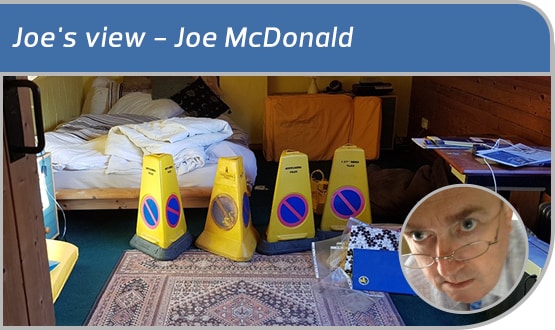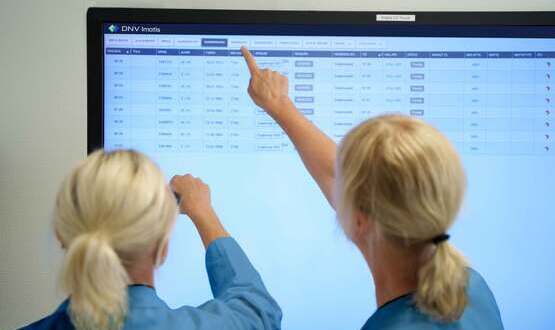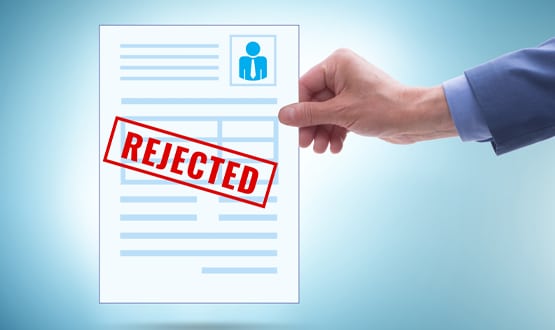Joe’s View: We need to talk about digital identity
- 22 February 2018

My attic is full of traffic cones. Why? Well it’s do with identity.
When I was a boy, underage drinking was the ambition of any self-respecting 16 year old and this was generally achieved by going to pubs which were known to have a lenient attitude to serving alcohol to minors.
The tallest and hairiest of our friendship group would take our pooled funds and order four pints of vile tasting bitter stuff in a deep voice while the more fresh-faced would hide in the snug, out of sight.
We would then choke down the beer, because that’s what men do. We would be polite and well-behaved so as not to draw attention to ourselves and risk exclusion from the forbidden pleasures of the pub. The landlord would turn a blind eye, as did the police, safe in the knowledge that they knew where the underage drinkers were should they need to find them.
ID crackdown
In the last few years however there has been campaign against this tolerance of teenagers in pubs and it is now impossible for teenagers to blag a drink in a pub without showing some proof of age, a passport or a driving licence or any other ID.
My children routinely take their passports on a night out. This campaign has had, I think, some unforeseen consequences.
Instead of congregating harmlessly in a few pubs and chugging unpalatable ale, our youth have been driven to drinking vodka and coke in the park, where they can also access and use cannabis and other drugs. Not exactly what we’d hoped for in the ID crackdown.
In the face of this reality, we gave up our attic to our teenage children and it became a hangout for their friends over the years: an unofficial, unacknowledged unlicenced teenagers’ pub.
We turned a blind eye to the beer bottles in the recycling bin and fag-ends in the garden. At least we knew where they were and we could minimise exposure to park-dwelling drug dealers.
Once driving licences and passports were acquired, the young people’s drinking moved to pubs and night clubs but at the end of the evening they usually return to the attic, often wearing a traffic cone on their heads. As night follows day, the acquisition of ID leads to drinking in pubs and traffic cones in the attic.
With my youngest now away at university, the attic is disused so I have decided to get the builders in and convert it into an online psychiatry clinic. Somewhere I can practice telepsychiatry, somewhere quiet and away from the rest of the house.
Saint Skype’s Online Asylum is the working name of the project. Saint Skype’s online psychiatry service will need to be able to establish the identity of its customers. Identity is key.
Interestingly it was my youngest son, who still gets asked for ID and has lost his driving licence, while being out and about, more than once, who pointed me at a potential solution: “Digital ID, dad. The future. Physical passports, driving licences? Nobody wants to carry that stuff on a night out, right? If you lose your passport it’ll cost you eighty quid, dad. 80 quid”.
Digital identity is the solution
Jake’s preferred solution? YOTI . YOTI is a digital identity app for your smartphone that recently raised £65 million in venture capital investment.
In a very simple process, which the app walks you through, it captures your image, a selfie video, an identity document ( I used my driver’s licence) and a two- factor authentication process. All done in 2 minutes without the need to visit the post office or fill in any forms.
Now all Jake needs is his phone to prove his age at a nightclub or pub.Door staff ask him to prove his age using YOTI, he scans the venue’s QR code and the app confirms he is over 18. He shares no more data than he needs to.
The app can also be used to confirm people are who they say they are if you are conducting business online like Saint Skypes.
Now, identity isn’t just key to the future of Saint Skypes. It is key to the digitisation of the NHS. I wasn’t able to attend last week’s Empower the Person meeting, where Andy Kinnear described Juliet Bauer’s presentation as mind-blowingly exciting, which created ripples (of positive nature) in the Twittersphere..
The Citizen ID piece of work is so central to the business of channel shifting our population onto digital health platforms that it should be priority number one for the NHS.
Everything else will stand on the foundations of useful, usable and widely used citizen ID platform. And with innovative British outfits like YOTI and Monzo leading the way, we may not have to look too far to find solutions that move the NHS into being a world leading research outfit.
It warmed my heart to see Simon Eccles, the new National CCIO, spelling out his priorities on Twitter this week to include “deliver the stuff we said we’ll do”. Well, we’ve been saying we’d do citizen ID for some considerable time, and we can’t really do anything meaningful without it. Hopefully this can be given the priority it needs under the new management.





15 Comments
In the words of Keith McNeill, proceed until apprehended. Dont seek permission, just do it.
We should be careful what we wish for in the digital ID space:
https://www.theverge.com/2018/2/1/16721230/wechat-china-app-mini-programs-messaging-electronic-id-system
Interestingly I’m dealing with innovative SMEs that want to provide smartphone apps that effectively enable patients to interact with the NHS Digital Personal Demographics Service (PDS). We are having to look very closely at the safety of the information slows, to avoid spoofing, and also tell them that any update to the PDS requires the use of a smartcard. Of course patients don’t have smartcards, and never will. Something like YOTI could be the way ahead. However, we’d have to think about the increased load on the PDS!
It is not true that “patients don’t have smart cards, and never will”. If you are a French patient you will have a smart card. I sometimes think smart cards were invented by the French back in the ’80s just to provide a medium for effective patient records.
If you want to study identity in healthcare, forget the UK. Johnny foreigner knows how to do it. They also know how to fund their healthcare intelligently. Get ill in France or Spain, or Germany, and find out for yourselves. But hurry, Brexit will stop you finding out.
https://www.digitalhealth.net/2017/04/citizen-identity-project-will-be-live-by-october-2017/
Bingo. It’s still an active project.
On the tech level OAuth2 UMA (or healths HEART) May have answers, it should be possible to use this with citizen Id or YOTI.
Finally we would be able to ask the patient for consent rather than talking about it in meetings for several months!
The privacy mafia will stop it
Do you mean David Davis who scuppered the National ID card proposed by Tony Blair’s government?
No – The system to share data between organisations involved with children that was being developed after several deaths that could have been preventable. It was scrapped due to the possibility that somebody could get access to the data who should not – against the certainty that children would die because there was no such system.
Even easier to chip the kids when old enough to drink?
How about the using/amending the Government Gateway or Gov.Verify IDs? Please, please, please don’t create another one to forget!
This was attempted in Liverpool – http://www.computerweekly.com/news/4500279751/Govuk-Verify-not-secure-enough-for-the-NHS-says-HSCIC
Telepsychiatry sounds like something from a Poul Anderson novel, combining telepathy and mind control 🙂
Seriously, YOTI exposes just how outdated concepts which seemed futuristic only fifteen years ago, such as using a smart card to authenticate users, have become.
I read somewhere that one day even NHS fax machines might be overtaken by new technology 😉
This was attempted in Liverpool – http://www.computerweekly.com/news/4500279751/Govuk-Verify-not-secure-enough-for-the-NHS-says-HSCIC
Sorry, bug in chat forum. Had clicked to reply to earlier post.
i couldn’t agree more with the need for a decent digital identity process.
Its so fundamental. Without a painfree authentication process for patients, we’ll never get users to even register for new services and apps, no matter how beneficial they may be.
Comments are closed.